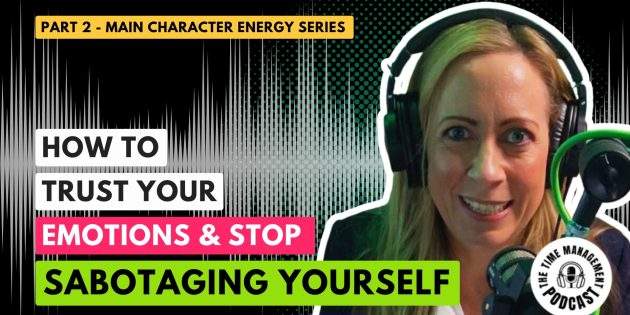This week, we talk about emotions, how to stop sabotaging yourself, how to recognise emotional triggers, how to trust your emotions and how to use them as a compass.
In Episode 81 of The Time Management Podcast, we dive into the science, psychology, and practical tools behind learning how to trust your emotions—and why doing so is the key to becoming the main character in your life.
We’ve been taught to think emotions are messy, irrational, and untrustworthy. But what if that’s complete rubbish? In fact, what if your emotions are the exact thing that can help you stop self-sabotaging and start stepping into your power?
Emotions Aren’t Weakness—They’re Data
For centuries, philosophers and scientists have tried to make sense of our emotional landscape. From Aristotle’s early observations to modern neuroscience, it’s become clear: emotions are not the enemy. They are biological, neurological, and deeply intelligent responses that serve a purpose.
Professor Paul Ekman’s research identified six universal emotions, while tools like Gloria Wilcox’s Feeling Wheel and Robert Plutchik’s Wheel of Emotions show just how layered and nuanced our feelings really are. Recognising the difference between emotions and feelings helps us build emotional intelligence and break free from limiting behavioural loops.
“Emotions are not weakness. They are science. They are tools—and they can be trusted.”
Why You’re Stuck—and How to Shift It
If you find yourself stuck in patterns of procrastination, people-pleasing, or fear of failure, there’s likely an emotional root cause. Emotions are often behind the triggers that lead to unhelpful thoughts and habits. Becoming emotionally self-aware means learning to identify, name, and work through these emotions—rather than ignore or suppress them.
Start with this simple 3-step process:
- Name the emotion you’re feeling.
- Reflect on what triggered it and where it might come from.
- Take action—shift your state, move your body, or reach out for support.
This process builds momentum, which is more powerful than motivation. Momentum turns awareness into action.
Somatic Healing & Emotional Triggers
Emotions don’t just live in the brain—they’re stored in the body. Somatic healing practices like shaking, yin yoga, or breathwork can help release stuck trauma and bring your nervous system back into regulation. These tools aren’t fluff—they’re rooted in neuroscience and used by therapists around the world.
“Just because the science isn’t there yet doesn’t mean something isn’t real. Wi-Fi would’ve sounded like witchcraft once too.”
Why This Matters
Learning to trust your emotions is about more than just “feeling better.” It’s about building resilience, clarity, and a strong internal compass. If you’re ready to become the main character of your life, emotional self-awareness isn’t optional—it’s essential.
“The minute you become aware of your emotions is the minute things start to change.”
Ready to Go Deeper?
Join the Magic May 25-Day Challenge to create real change with daily momentum, group support, and two clear goals to move you forward.
Because knowledge isn’t power—action is.
Use this Promo code to get £50 off when you sign up MAGICMAYEASTER50 | valid until 24 April (13:13 BST)
Because real change isn’t a concept—it’s a process.
Watch the Episode on YouTube & Subscribe ⇩
 THE TIME MANAGEMENT PODCAST
THE TIME MANAGEMENT PODCAST 
→ Subscribe & Follow to get notified when new episodes get uploaded each week
→ 
Website: www.successbydesigntraining.com
Podcast Website: www.thetimemanagementpodcast.podbean.com
Email: enquiries@successbydesigntraining.com
Disclaimer: This content does not aim to replace professional medical advice or therapy. Please seek the support you need where necessary. Success by Design Training accepts no liability.
